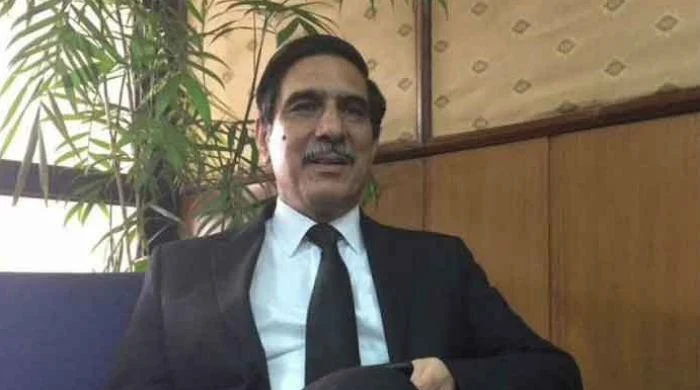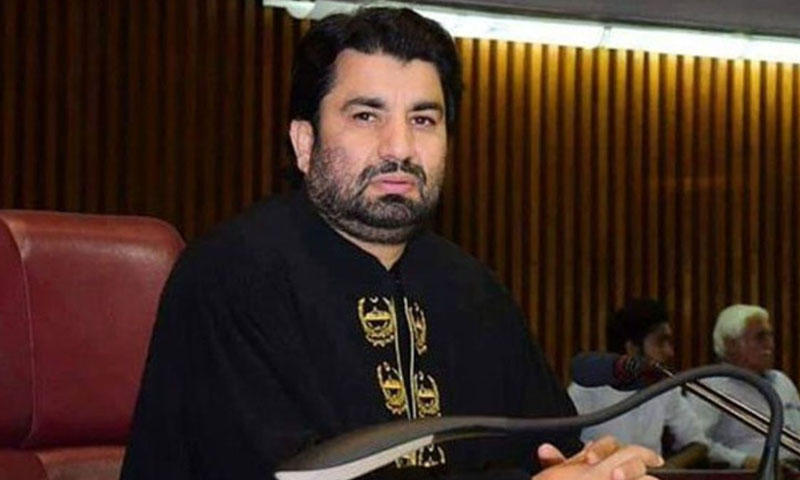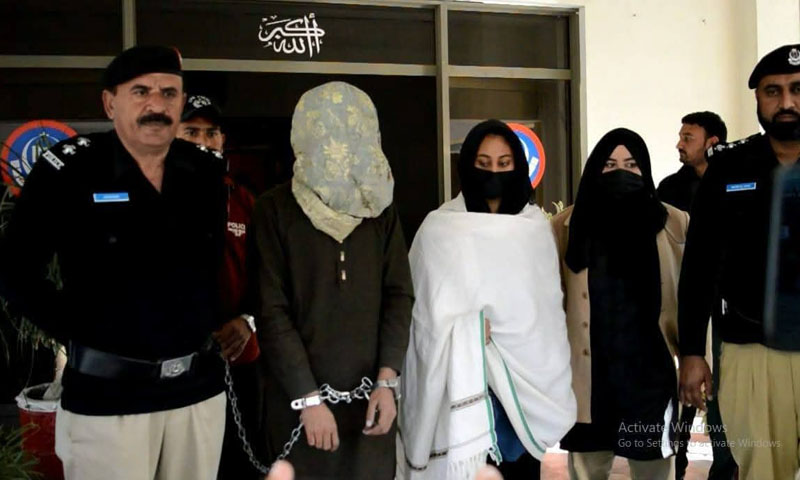- Web Desk
- Feb 09, 2026
Khawaja Haris makes case for military courts in front of Constitutional Bench
-

- Web Desk
- Jan 29, 2025

ISLAMABAD: The Supreme Court began hearing on intra-court appeal against trial of civilians in military courts. A seven-member bench headed by Justice Aminuddin Khan is hearing the case.
Defense Ministry’s lawyer Khawaja Haris resumed his arguments from yesterday. Referencing Rule 19, he said, “The law is clear about the difference between trial and fair trial.”
Justice Musarrat Hilali said, “My question was the same yesterday as well, does the investigation take place before the charge?” Justice Muhammad Ali Mazhar added, “First the investigation takes place and then the charge is made.”
SC bench discusses review pleas’ admissibility against military trials
Khawaja Haris responded, “A joint investigation is carried out after the charge is framed.”
Justice Jamal Khan Mandokhail said, “If there is a decision, can any remedy be taken against the order; meaning, the same punishments are imposed in this case too?” Justice Mazhar added, “If the accused does not confess, then what will be the procedure.”
“Will the case will continue the same even if the accused does not confess?” Justice Hassan Azhar Rizvi reiterated.
Lawyer Khawaja Haris gave arguments on the procedure of military trial under the Army Act. He informed the bench that the Judge Advocate General takes oath to maintain impartiality. “Supreme Court cannot examine each case individually in this hearing. The case under Article 184, Clause 3, is not before the court before the Supreme Court,” he added.
Justice Mandokhail asked, “On what basis can a military trial be challenged?”
Khawaja Haris replied, “If there is no authorised court, if the proceedings are malicious, or if the hearing power is exceeded, the trial can be challenged.”
Constitutional Bench discusses military courts, 21st amendment
He added, “If an accused in a military trial confesses the crime, he gets concession under Islamic law.”
Justice Mandokhail said, “But the confession of the crime takes place before a magistrate.” To this the counsel said, “That matter is different.”
Justice Rizvi asked, “If an accused in a military trial cannot afford a lawyer, is he given a lawyer at the government’s expense?” Khawaja Haris responded in affirmative.
“Usually, the accused is the favorite child of the court. Is the accused considered a favorite child in the military court as well?” Justice Mandokhail asked.
“Under the rules of the Army Act, the accused is given full protection,” Defense Ministry’s lawyer answered.
“As Chief Justice of Balochistan High Court (BHC), I have heard appeals against the decisions of the military courts,” Justice Naeem Akhtar Afghan said, adding, “It doesn’t happen like this that a piece of paper is submitted declaring that the accused is guilty or innocent. If an appeal is filed against the decisions of the military courts in the High Courts, the GHQ provides the entire record.”
“Apart from the May 9 cases, please also give some examples of the decisions of past military courts,” Justice Afghan asked Khawaja Haris.
Justice Mandokhail said, “In 1992, if a case was taken before a magistrate, he would also punish the accused on the basis that a murder had taken place. A session judge becomes a session judge after 20 years of hard work.”
Khawaja Harris responded that “Those using social media are not interested in the facts.”
“Does a defense officer have any experience or not?” Justice Rizvi reiterated, adding, “Can a judge advocate be present in the court? Can a court martial be conducted?”
Constitutional Bench delves deeper into Army Act, civilians’ trials in military court
Justice Mazhar asked if the military courts’ justices sit the same way as the current bench. In response to this Lawyer and Parliamentarian Latif Khosa stood up and said, “The judge advocate sits with the judge.”
“We have suffered, we know,” Khosa added.
Justice Aminuddin reprimanded Latif Khosa for repeatedly standing on the seat, saying “This is not the way, you will speak on your turn.”
“Today, our country has become so trained that two individuals call a verdict by eight judges wrong,” Justice Mandokhail asked, adding, “When the trial is completed, is there any certificate given?”
Khawaja Haris referred to Article 14 in his response, adding, “Justice Ayesha Malik has disagreed with one point in her judgment.”
“Courts in Pakistan are formed under Article 175A, if someone gives a decision outside of Article 175, does it come under its jurisdiction?” Justice Mandokhail asked.
“All sections in the FIR come under the PPC,” Justice Hilali added.
“If the military trial is that good, then all the cases should be sent to them,” Latif Khosa added again.
Khawaja Haris offered to explain the standard of basic human rights in a military trial.
“Full opportunity for public hearing is given. A free and impartial trial is held, the requirements of a transparent trial are met,” Khawaja Haris said, adding, “Article 175A states that the court should be independent. Military courts are also independent.”
Justice Mandokhail said, “Justice should not only be done, but it should also be seen being done.” He added that a judge conducting a military trial is subordinate to the authorities.
Khawaja Haris replied, “If anyone has any evidence [of wrongdoing], then speak up, but objections cannot be raised on mere perceptions.”
“I neither have any doubt nor objection against anyone,” Justice Mandokhail responded, adding, “The question is who are the ones conducting trials in military courts, that is why I asked.”
Justice Rizvi said to the Defence Ministry’s lawyer, “I reviewed the record presented by you. I did not go into too much detail. But the May 9 incidents do not seem to be a matter of state security.”
He said that the trial of the May 9 accused was conducted in a lot of detail. “Shouldn’t these trials and record of crimes be made public, so the public can condemn them?”
SC’s Constitutional Bench debates civilian trials in military courts
“This is for the authorities to decide,” Khawaja Haris answered.
Then Justice Mandokhail asked, “Is there room for the establishment of military courts under Article 175?” Khawaja Haris responded, “If the court goes in this direction, all the decisions given so far regarding the establishment of military courts will have to be reviewed. The constitution mentions the establishment of courts under the constitution and law. Military courts have been established in many countries.”
Justice Mandokhail raised the point that even though the army has full control over narcotics, “when an accused has to be tried in narcotics [cases], a session judge is sought from the Chief Justice concerned. Can this be done for military courts here too?”
Khawaja Haris said, “In all court decisions, military courts have been kept separate from Article 175. The Army Act cannot be challenged on the basis of fundamental rights.”
After hearing counsel’s arguments, the constitutional bench adjourned the hearing until tomorrow.




